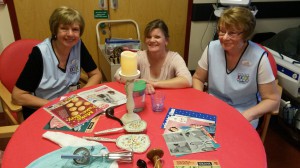 Solihull Hospital is appealing for kind-hearted volunteers to spend time with elderly patients and help prevent delirium, a common condition affecting up to one in three patients over the age of 70.
Solihull Hospital is appealing for kind-hearted volunteers to spend time with elderly patients and help prevent delirium, a common condition affecting up to one in three patients over the age of 70.
Patients with delirium can be confused, agitated, drowsy, less mobile and they can have hallucinations. Although it’s a short-term condition, the effects can be long-term and distressing, with potentially longer stays in hospital and a higher chance of developing dementia in the future.
There are several factors which can cause delirium, but the most common are pain, infection and changes to medication. Even something as simple as constipation can cause a case of delirium for a vulnerable patient, especially those aged over 65 or who may already have dementia.
The good news is that, with specialised care, up to a third of new cases of delirium can be prevented and you don’t have to be a nurse or doctor to help. Solihull Hospital is looking for volunteers to spend time on wards with patients, carrying out everyday activities such as encouraging eating and drinking, helping with orientation and supporting activity such as playing card games or doing jigsaws.
Volunteers will receive training from specialised hospital staff and are asked to dedicate a minimum of three hours a week but can volunteer for as many as they would like to.
Phillip Hall, senior nurse for dementia at Solihull Hospital, said: “Delirium is a condition which is rarely talked about and people are often too embarrassed to mention it after they recover.
“It can be very traumatic with some patients having frightening hallucinations or delusional beliefs and it can cause a great deal of anxiety and distress. The outcomes can also be very serious, with increased stays in hospital and the chances of developing a new dementia rising by six times.
“Our volunteers bring a much-needed sense of wellbeing to our elderly patients and just spending time with them talking or drinking tea, makes a huge difference because it keeps their lives as normal as possible while they are in hospital and helps us to prevent people developing this serious condition.”
If you think you can offer your time and care to support elderly patients, please contact Phillip Hall or a member of the Dementia and Delirium Outreach Team on 0121 424 4277, e-mail phillip.hall@heartofengland.nhs.uk or follow them on Twitter @DADOTSH1.






